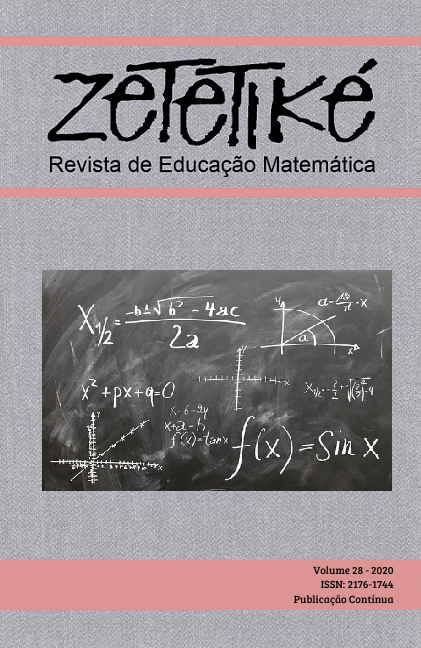Abstract
The goal of this article is to present an analysis of the knowledge of future Mathematics teachers about teaching probability, in particular, about randomness. This investigation involved a formative process in which the issue of event independence was discussed from the results pointed out by Bryant & Nunes. This process was attended by 11 students in the Mathematics Teaching Degree program on a campus at a public university in Sergipe. To analyze the data on the teachers’ knowledge, we considered categories discussed by Shulman. This research was based on studies by Gal e Batanero, Contreras & Diaz, regarding teaching probability. On the reflective practice of teachers, Zeichner was used. The analysis revealed that the future teachers broadened their knowledge base for teaching probability, especially regarding the recognition of the need to overcome positive and negative recency in order to understand the independence of events. In addition, they reconsidered a view contrary to what they had initially believed, with respect to teaching in the initial years. Hence, we highlight the importance of training activities in order to provide participants with a reflective experience in learning situations that involve concepts of probability, through experiments and reflections.
References
Batanero, C., Contreras, J.M., & Díaz, C. (2011). Experiencias y sugerencias para la formación probabilística de los profesores. Paradigma, 32 (2), 1-21. Disponível em: https://www.ugr.es/~batanero/pages/ARTICULOS/Paradigmanuevo.pdf.
Bogdan, R., & Biklen, S. (1999). Investigação qualitativa em educação. Uma introdução à teoria e aos métodos. Porto: Porto Editora.
Bryant, P., & Nunes, T. (2012). Children’s Understanding of Probability: a literature review. London: Nuffield Foundation. Disponível em:
http://www.nuffieldfoundation.org/sites/default/files/files/Nuffield_CuP_FULL_REPORTv_FINAL.pdf
Bryant, P., Nunes, T., Evans, D., Gottardis, L., & Terlektsi, M. E. (2012). Teaching primary school children about probability. Oxford: Teacher Handbook.
Cobb, P., Confrey, J., Disessa, A., Lehrer, R., & Schauble. L. (2003). Design experiments in educational research. Educational Researcher, 32 (1), 9-13.
Gal, I. (2005). Towards “Probability Literacy” for all citizens: Building blocks and instructional dilemmas. In: Graham A. Jones (Ed.) Exploring probability in school: Challenges for teaching and learning. Kluwer Academic Publishers, 43-70.
Godino, J. D., Batanero, C., & Cañizares, M. J. Azar y Probabilidad. España: Editorial Síntesis.
Lopes, C. E. (2008). O ensino da estatística e da probabilidade na educação básica e a formação dos professores. Cad. CEDES, 28 (74), 57-73.
Lopes, C. E. (2010). A educação estatística no currículo de matemática: um ensaio teórico. Anais da 33ª Reunião Anual da ANPED (pp. 1-15), 2010. Caxambu: Associação Nacional de Pós-graduação e Pesquisa em Educação. Retirado em 02 de outubro, 2019, de: http://33reuniao.anped.org.br/33encontro/app/webroot/files/file/Trabalhos%20em%20PDF/GT19-6836--Int.pdf
Australian Curriculum Assessment and Reporting Authority (ACARA). (2010). Australian Curriculum: Mathematics. Sidney.
Ministério da Educação (MEC). (2018). Base Nacional Comum Curricular – Educação é a Base: Ensino Fundamental. Brasília.
Ministerio de Educación, Cultura y Deporte (MECD). (2014). Real Decreto 126/2014, de 28 de febrero, por el que se establece el currículo básico de la Educación Primaria (Royal Decree establishing the minimum content for primary education). Madrid.
Ministry of Education (ME). (2007). The New Zealand curriculum. Wellington: Learning Media.
National Council of Teachers of Mathematics (NCTM). (2000). Principles and standards for school mathematics. Reston.
Nunes, T., Bryant, P., Evans, D., & Barros, R. (2011). Children’s Understanding of Probability and Risk. Oxford: University of Oxford.
Piaget, J., & Inhelder, B. (1975). The Origin of idea of Chance in Children. New York: Norton.
Santos, J. A. F. L. (2010). O movimento do pensamento probabilístico mediado pelo processo de comunicação com alunos do 7º ano do ensino fundamental. Dissertação de Mestrado em Educação. Itatiba: Universidade São Francisco.
Santos, J. A. F. L. (2015). A produção de significações sobre combinatória e probabilidade numa sala de aula do 6º ano do ensino fundamental a partir de uma prática problematizadora. Tese de Doutorado em Educação. Itatiba: Universidade São Francisco.
Shulman, L. S. (1986). Those who understand: Knowledge growth in teaching. Education Researcher, 15 (2), 4-14.
Shulman, L. S. (1987). Knowledge and teaching: Foundations of the new reform. Harvard Educational Review, 57, 1-21.
Zeichner, K. M. (1993). A formação reflexiva de professores: ideias e práticas. Lisboa: Educa-Professores.
Zeichner, K. M. (2003). Formando professores reflexivos para a educação centrada no aluno: possibilidades e contradições. In: Barbosa, R. L. L. (Org.) Formação de educadores: desafios e perspectivas (35-55). São Paulo: UNESP.

This work is licensed under a Creative Commons Attribution-NonCommercial-NoDerivatives 4.0 International License.
Copyright (c) 2020 Zetetike


